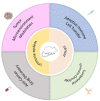Humanized Rodent Models for Cancer Research
- PMID: 33042811
- PMCID: PMC7518015
- DOI: 10.3389/fonc.2020.01696
Humanized Rodent Models for Cancer Research
Abstract
As one of the most popular laboratory animal models, rodents have been playing crucial roles in mechanistic investigations of oncogenesis as well as anticancer drug or regimen discoveries. However, rodent tumors show different or no responses to therapies against human cancers, and thus, in recent years, increased attention has been given to mouse models with xenografted or spontaneous human cancer cells. By combining with the human immune system (HIS) mice, these models have become more sophisticated and robust, enabling in vivo exploration of human cancer immunology and immunotherapy. In this review, we summarize the pros and cons of these humanized mouse models, with a focus on their potential as an in vivo platform for human cancer research. We also discuss the strategies for further improving these models.
Keywords: cancer; humanized mice; immunology; immunotherapy; rodent.
Copyright © 2020 Tian, Lyu, Yang and Hu.
Figures
References
-
- Hidalgo M, Amant F, Biankin AV, Budinska E, Byrne AT, Caldas C, et al. . Patient-derived xenograft models: an emerging platform for translational cancer research. Cancer Discov. (2014) 4:998–1013. 10.1158/2159-8290.CD-14-0001 - DOI - PMC - PubMed
Publication types
LinkOut - more resources
Full Text Sources
Research Materials
Miscellaneous


